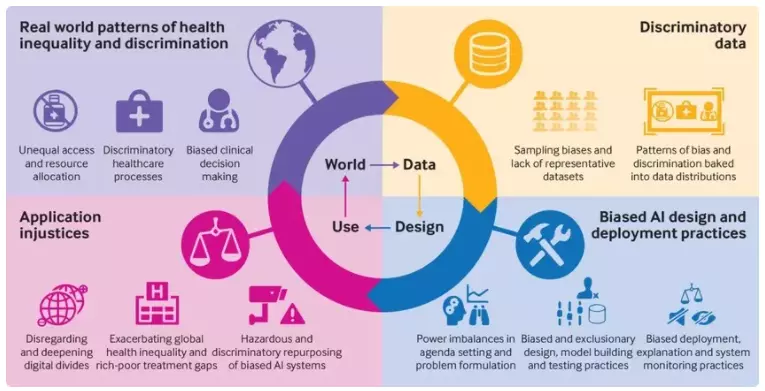We live in a world today where businesses are innovation and technology driven. But is that all a business needs? Let me make it very simple. I agree with the fact that technology always offers new and exciting choices. But it is ethics that can make us aware of which among the choices are good and a convenient option. That’s when we get the chance to choose wisely and make our lives trouble free. Therefore, in this article we will get an idea about the significance of ethical technology and how you can practice it in your organization for creating a culture of trust and excellence in the utilization of resources.
The concept of ethical technology
What does ethics mean in technology? Ethical technology can be considered as a very diverse concept which is not focused or limited to just a single technology, but rather it is a comprehensive set of values that helps in addressing a company’s approach towards the utilization of technologies and the methods in which they can be deployed to enhance business strategies and operations. It is very important for the organizations to use the technologies in a manner that are aligned with their basic purpose and the core values and beliefs.
Next, to talk about the ethical technology policies, they basically are not seen replacing general compliance or business ethics, but there should be some connection between them in some way or the other. For example, just as the way your approach in regards to cybersecurity hasn’t been prioritized over your company’s general privacy policies, your ethical technology approach should emphasize your overall approach to ethics leading to better decision making at your organization. You will observe that some companies are preferring to expand the mission of their existing ethics, also encouraging learning and inclusion to prioritize ethical technology, at the same time maintaining separate technology ethics programs. By taking such initiatives, it helps in understanding the significance of technology ethics within the organization, and also enables executives to recognize the differences between technology-related ethical concerns and broader professional ethics issues. Such initiatives can be considered as ethical technology examples that encourage every organization to embrace technology ethics.
Need of ethical technology
Why are ethics important in technology? This section will give you an idea about the necessity of ethical technology in your organization, also answering the question: What is an ethical way of using technology? Well, let us take a look at how the impact of ethical technology can have a huge impact over the company’s ability in building value in the future. To start with, the meaning of technology has completely changed in the business context. The Chief Technology Officer at Thoughtworks, Rebecca Parsons shares that some decades ago, when it was majorly limited to accounts or payroll systems, it either worked correctly or it sometimes didn’t but there was very less possibility that things could go wrong from an ethical point of view. For instance, if there was proper functioning of the software and no fraud involved, then there has to be no ethical implications for sure. Therefore, it was indeed very easy to recognize whether something worked as planned or not.
On the contrary, today when technology is seen embedded in highly sensitive sectors like healthcare, criminal justice and access to financial services, the ethical impact of getting something wrong can be far greater, expresses Parsons.
Secondly, things like consumer awareness and sensitivity in regards to ethical issues is possibly at an all time peak, and also according to one of the recent surveys of consumers in the US, for instance finds that a majority of people (68%) consider sustainability to be important while making a purchase and 49% people prefers to pay more for sustainable products.
You get to find many technology-driven ethical lapses, for example, Apple’s credit card was seen offering different credit limits for both men and women which was totally unfair, and racial bias with UnitedHealth algorithm can altogether question the culture of trust and business ethics in an organization. Therefore, a company should ethically use its technology and maintain a good reputation and fairness among its clients leading to a brighter business future. And with the growing time, the companies have also understood that ethical lapses in regards to the development, deployment and adoption of technology can be really costly, also buyers and regulators in some cases are seen turning their concerns and issues into action via consumer boycotts.
But let me tell you one thing that the organizations which do not consider technology as their primary business may presume such considerations to be completely irrelevant. However, regardless of the industry, or any sector, the organizations today are entirely dependent on advanced digital and physical technologies in order to run their daily operations. So, the companies need to be careful or else the disruptive technologies might bring threat to their reputation if the technologies aren’t handled the right way within the organization. On the other hand, if the technologies are looked after well then they can possibly provide better transparency, improve security, enhance data privacy and strengthen the company's trust position. According to a survey conducted by Deloitte, it is found that there is a strong correlation between companies that vigorously consider the ethics of Industry 4.0 technologies and growth rates of the company. For example, the companies which are experiencing a low growth (up to 5 percent), only 27% of the respondents expressed that they completely considered the ethical outcomes of these technologies. And, on the contrary, 55% of the respondents from the companies that are seen growing at a rapid rate of 10% or even more are majorly concerned about such ethical considerations.
Also, in an another report which was published by the World Economic Forum in collaboration with Deloitte and the Markkula Center for Applied Ethics at Santa Clara University “Ethics by Design - An Organizational Approach to Responsible Use of Technology", it was examined how the organizations successfully incorporated ethics into their use of technology that helped in building a strong and more sustainable businesses for all. Here’s the complete guide on ethical design to know more.
Ethical technology and trust

Trust building is one of the most important responsibilities of an organization that helps in overall growth and development. So, when it comes to technology, how are businesses supposed to build trust with the emerging technologies their employees, clients and partners are using? Let’s find out.
- Encoding your organization’s values. Since technology is entrenched in businesses and machine learning impacts on business decision making and actions, therefore, an organization’s values must be encoded and also measured within its very own technology solutions. There is a need to design the digital systems in a manner that can possibly reduce partiality allowing companies to be ethical in terms of their business principles and values. And, also Explainable AI technologies help in clarifying the process in which AI driven decisions are made. For example, to improve confidence in AI-supported medical diagnoses, health care companies tend to develop solutions which can assign every diagnosis a confidence score that helps in explaining the probability and contribution of each patient symptom (vital signs, signals from medical reports, lifestyle traits, etc.) to that diagnosis. Further, the clinical professionals are enabled to recognize why the conclusion was made and if necessary, make a different one that can be suitable.
- Building a strong data foundation. It is important to efficiently and consistently track the kind of data you have, where it lives, and who has access to it in order to create an environment of trust. Hence, as an entrepreneur you need to build a strong data foundation which can unify the stakeholders around a significant vision of data accountability and help in providing secure technology that can support data management effectively.
- Be prepared with your defenses. According to Deloitte’s 2019 Future of Cyber Survey, the company executives are seen spending sufficient time looking into the cyber issues due to the growing numbers of cyber security attacks. With the help of cyber defense, you are able to protect your clients, employees and business partners from the ones that violate your company work ethics and values. Without any further delay, cyber risk strategy should be built and embedded in the business mindset and policies. Therefore, a comprehensive cyber risk strategy can be created by the collaboration between business leaders and the Information technology(IT) leading to stakeholders trust building, encompassing security, privacy and integrity.
Role of leaders in the ethical technology
Leaders play a major role in supporting the ethical decision-making which is importantly required in an organization. They have a responsibility to develop an ethical mindset among their employees and make them rightfully take the company decisions. Some of the companies prefer appointing chief ethics officers to look after corporate and professional ethics. For example, Salesforce made a decision of appointing a chief ethical and humane use officer who could guide the company in regards to the technology usage for better company growth and outcomes. Therefore, the function focuses on ensuring the fact that the company holds a clear framework which can guide in making the right technological decisions, and appoints an executive who can bring together internal and external stakeholders and also experts to make sure that the framework is good enough to account for the emerging technology use cases. Also, leaders in Microsoft created an AI and Ethics in Engineering and Research Committee, recently which was composed of senior leaders from over the company working all together to observe and address concerns which might arise while the company proceeds towards the development of its AI platform and related solutions.
The organization’s leaders can embrace an ethical technology mindset with the following approaches, and can make the company employees understand the importance of ethics in technology.

- A drive with regard to a shared, inclusive, cross-functional responsibility. Ethical tech can be considered as a shared responsibility which must engage all the functions and also be championed at the top. While discussing ethics and AI technologies, Mala Anand, SAP president of intelligent enterprise solutions and industries, says, “Delegating responsibility [to the technology department] is not the answer. Creating ethical and effective AI applications requires engagement from the entire C-suite.” Also, it is seen that most of the people in an organization considerably use technology, and come through ethical tech at some point of time. Therefore, only giving the responsibility of enhancing ethical tech to only a limited number of groups or functions might give a wrong idea to the employees that this topic isn’t of much importance and need.
- Need to be ethically driven from the beginning. If you want to stay ahead of potential ethical tech challenges, then you will have to design new technology-driven products and services along with ethical principles and values in mind from the beginning. Basically, instead of prioritizing ethical ideas towards the end of the product development cycle, it is preferable to incorporate ethical tech considerations at the very start of your strategy and services.
- Need of making it relevant, specific and flexible. You need to develop a guiding framework which addresses technology use cases specific to your company and its culture. While working through the ethical tech decision-making framework, you can test its importance by applying it to particular technology use cases your company routinely witnesses and the manner in which your people work both individually and together. It can further help you in crafting guidance which is convenient to your necessities and flexible enough to progress with emerging new technological implementations.
- Need to ensure that it’s more than compliance. You are required to make ethical tech awareness, recognition, and decision-making frameworks an important part of the organization’s cultural DNA and not only a compliance or policy activity. It is necessary that every employee of the company acknowledges potential technology-related ethical dilemmas. Also, it shouldn’t be an excuse for the people who are not involved in technology to live with unawareness about the ethical concerns.
- Need to equip your employees with the resources to respond. It is very important to avail your people with the necessary resources which helps in making the right ethical decisions in regards to technology. The organizations should take the responsibility in providing their employees with the suitable resources, assets and tools to enable their employees to acknowledge ethical dilemmas, evaluate alternatives, and take ethical tech decisions.
- Need to ensure that your approach can progress. As you can see that technology is advancing rapidly, so the approaches made in terms of ethical tech can’t be just established and be forgotten, they indeed need to be evaluated and updated as per the need and necessity. The pace at which the markets are changing, the policies that were established a few years back might not even directly address the current risks. So, while developing the policies or frameworks which can guide technology decisions, you need to keep in mind that they should be able to adapt and adjust since the technologies tend to change and the market conditions also progress with the passing time.
The process
Let us now look at the process in which a strong foundation for ethical technology can be built.

By respecting stakeholder privacy
As we all know that the transactional details of our lives were pretty much kept in physical file cabinets that were referred for any particular needs. But today, the systems are easily able to collect such details and merge them with our purchase histories, make posts on social media, do online searches and many more. So, if by any chance the consumers feel that their data is not being used rightfully, they might go for boycotts, public inquiries, and also severe penalties under strict regulations, such as the European Union’s General Data Protection Regulation and California’s Consumer Privacy Act. Therefore, organizations need to create data privacy which can build the necessary public trust, and ensure a proper alignment between the data usage and the organization mission.
By providing full transparency
Organizations should look forward to building trust with stakeholders by exhibiting good behavior. Since, transparency is vital, if the organizations tend to have transparent policies, then it helps in providing confidence to the stakeholders that they are in the right place and can continue their work roles and responsibilities.
By respecting differing cultural norms
A company’s approach towards building trust shouldn’t be only confined to interests, experiences, and professional standards but instead should also include societal norms and government controls. You might find it challenging to offer service to a global market in which expectations on government surveillance or law enforcement cooperation vary broadly. For instance, the expected surveillance in some countries may appear outrageous in some other places. Also, cooperating with law enforcement might just be a routine in some countries, but possibly unwise in places with corruption or insufficient protection for political or religious rights. So, an effective governance of emerging technologies needs all suitable stakeholders – industry, consumers, businesses, governments and society to work together. Therefore, businesses can play a major role in helping governments since they develop laws and standards which increase the dependency of emerging technologies.
The elements
By taking into consideration the elements of ethical technology, an organization is able to create a comprehensive approach over multiple fronts, from product development to the way leaders communicate with their teams.

Diversity-Ensuring a wide range of viewpoints
Let me put light into the fact that any ethical issues or implications of the products a company builds can be completely looked upon by being examined from various viewpoints which demands the participation of diverse teams. Diversity should be prioritized and expanded beyond the lines of gender, ethnicity etc, since in an organization there is a need for potential people who can skillfully work regardless of different backgrounds, culture, personality, beliefs and life experiences. Therefore, Chad Wathington, Chief Strategy Officer at Thoughtworks says, “You certainly need people from design to be represented because they’re the stewards of how the customer interacts with the technology. But also, someone from finance because they might need to examine or balance the profit motive. And legal, compliance and security, so those processes aren’t a gate-check at the end, but built in from the start with the right concerns in mind.”
Learn more on diversity and inclusion here:
- How to champion diversity and inclusion in tech
- Diversity, equity and inclusion in open source
- Diversity, inclusion and Drupal: A triangle of great relevance
Inquiry-Orderly asking the tough questions
The Chief Technology Officer at Thoughtworks, Rebecca Parsons expresses that until the right group of people ask the right questions, it isn’t possible to get the suitable answers which can reflect upon the ethical implications of what you’re exactly building and particularly for the groups that aren’t represented. The right questions help in employing the formal tools and frameworks which can guide teams via structured processes of inquiry.
Constituencies-Considering multiple stakeholders
The product builders alone are not able to answer all the ethical questions or even consider all the impacts themselves. Especially for any innovation along with potentially game-changing outcomes for the society, there requires an effort in order to secure a wider consensus on what’s being created. Rebecca Parsons further notes, “When you start asking questions like what self-driving cars should do when faced with the dilemma of prioritizing the life of a driver or a pedestrian, it’s no longer something a programmer or some group of analysts sitting around a room should decide. These are questions that society as a whole needs to start tackling, and deciding what the right ethical response should be.” While introducing a technology, organizations need to consider the limitations or knock-on effects which might apply to particular groups like children, the disadvantaged or the elderly. Chad Wathington shares that it's important to understand all your possible users and the manner in which they experience your customer journey and use technology to communicate with you.
Methodology-Formalizing ethical procedures wherever feasible
The ethical guidelines are difficult to change, so there should be a basic estimation of what the organization intends to be and stand for, to form a ‘north star’ which can be used in order to guide technology decisions.
Laura Paterson, Principal Consultant, Thoughtworks further explains, “The first step is being clear about your mission, and it’s very seldom about technology - it’s always more than that. The next is defining values so everyone knows the parameters within which they’re working and making decisions. Subsequent to that is creating the channels for communication, and opening up the diversity of opinion”.
After setting the ethical standards and goals, they can be then formalized and inculcated , along with the establishment of frameworks for particular processes such as the early stages of product development, or the usage and retention of customer data.
Capability-Making constant attempt to improve the organization and its products
The companies should enhance the ethical technology approach like any other skill. It is the leader’s responsibility to introduce and encourage such approaches from the very beginning as the company staff on the front lines of product development and end-user communication will be facing directly the ethical choices in many cases.
Chad Wathington, Chief Strategy Officer, Thoughtworks says, “Without effective communication, ethics won’t become part of the general ethos. But what you’re trying to do with communication is affect a change in people’s hearts and minds so that they own it, and it’s not you as a leader trying to enact a change on them. You want to encourage people to innovate, to continue thinking about what they can do, and make their own contributions.”
Significant ethical issues in technology
What are the ethical issues around technology? Today business comes across a lot of ethical challenges. Therefore, crucial decisions are to be made to ensure that personal freedoms are protected and data is used appropriately. Below are the most significant ethical issues of 2021.

Misusing Personal Information
The manner in which businesses use customers' personal information is one of the major concerns in this technology driven world. So, by browsing internet sites, making online purchases, entering information on websites, engaging with various businesses online and participating in social media, we are continuously providing personal details. To hyper-personalize our online experiences, the companies try to gather information which might be a threat to our right to privacy.
Since it's very important for businesses to know what kind of products you are looking for and what type of content you are consuming. Therefore, to reach their set goals, the businesses tend to exploit such significant data that can be one of the primary ethical dilemmas of this modern times. For instance, Facebook has been found selling personal data various times over the years which is a major threat for its users.
Providing inaccurate information
During the 2016 and 2020 U.S. presidential elections, one of the things that majorly became evident was the potential of misinformation to get a broader support base. In today’s times we see that the internet is flooded with real-time events and the celebrities and politicians circulate views and opinions on social media without being aware of the it’s accuracy and relevancy. So, there is no proper convenient information validation process which was previously used to publish newspapers.
Non-acceptance of responsibility
Most of the companies are seen working with a hybrid stack, consisting of a blend of third-party and owned technology. So, when it comes to governance, use of big data, cybersecurity concerns and managing personally identifiable information or PII, there comes confusion in regards to responsibility. Whose responsibility is it to ensure data protection? Let me give you a situation. If you involve a third party for software which processes payments, would you bear any responsibility if the credit card details are breached? Basically, it is everybody’s job but businesses should be adopting an outlook where all the collective parties actively share responsibility.
Use of Artificial Intelligence (AI)
There isn’t any doubt that Artificial Intelligence definitely provides great business potential but we will also have to look at whether AI systems are bringing any ethical challenges for society. For more clarity, take a look below.
Facial recognition. Using software to find people can be very convenient but according to the NY Times, there are actually numerous concerns regarding facial recognition like misuse, racial bias and restriction of personal independence. As it can track your movements and activities it can bring threat to your privacy as well. Additionally, facial recognition isn’t foolproof which can create bias in specific situations.
Job Replacement. AI helps in increasing automation of low-level tasks in various situations so that human resources are utilized on much better strategic initiatives and complicated job roles. This leads to job reduction, making the workers feel majorly concerned about job security.
Health tracking. Contact tracing has become a very normalized thing after the pandemic, COVID 19. So, do you think it is ethical to track the health status of anybody and what kind of impact it will have on the limitations placed on them? It is an important matter to ponder upon.
Bias in AI. As technology is built by programmers so it is very obvious that biases will exist. Although AI systems make decisions based on training and coding data, it can be ruined by human bias leading to social inequities, believes Forbes. For example, one of the leading AI developers Google witnessed a concern where AI software understands that male nurses and female historians do not even exist.
So, we will have to certainly overcome these challenges for the betterment of the society. Therefore, according to a recent research, AI will be able to provide support in the advancement of 134 targets across the United Nations Sustainable Development Goals, and it might also inhibit 59 of the targets. Also, The digital technologies without prioritizing ethical considerations at their core, tend to have an unmatched capacity to strengthen and accelerate inequalities. It is not just only as a product of the persevering digital divide which can be referred as ‘the new face of inequality’ as 3.7 billion people happen to remain disconnected from the internet but even the ability of invasive or discriminatory applications. Therefore, such discriminatory applications act as a disadvantage in the financial, educational, health and employment contexts. Additionally, the consequences can be seen in cases like the health-care based risk prediction algorithm, used on an estimated 200 million Americans, that was exhibited to favor white patients over black patients due to a failure to get involved in proper testing with all primary racial groups before deployment.

The solution
It’s time for us to look into the solutions. The first effective approach which you can adopt is to clearly define the roles which are responsible for data and ethics. For example, organizations can appoint a data protection officer, a trust and ethics officer, or a chief ethics officer to make sure that they properly look after both compliance and trust via the ethical use of personal information. By creating such roles, you can give a clarity to your employees and customers that trust, privacy, security, and ethics are considered as a priority for maintaining the proper culture of your organization. I have already given you an example of how salesforce appointed a chief ethical and humane use officer for their company’s progress under the role of leaders in the ethical technology section. Hope you get a clear understanding from it.
Next, the developers can be given a clear picture of whom they should talk to about ethical issues and the data usage will ensure whether the applications they are developing comply with regulations and best practice or not. Also, the developers are seen following a range of different processes to make sure that the applications they develop comply with regulations with over half (52%) of developers working with those in their company who are responsible for it, while 27% are seen using a governance framework and 18% do not take part in any role in this aspect of a build. Since the developers use intelligent data platforms that have standards and frameworks, it allows them to develop every application in accordance with regulations, and it is especially significant for financial and healthcare institutions where personal data is stored in mass volumes.
Here is a video where Dr. Rebecca Parsons and Chad Wathington through a ThoughtWorks webinar helps us explore the processes and frameworks that can be used to foster an ethical technology practice and create successful outcomes for customers, employees and businesses.
Final thoughts
I suppose this article could give you a comprehensive idea about ethical technology. You can certainly now answer the following question: Why is it important to have ethics in technology? So, along with the progress in technological process, there also has to be an advancement in principles of technology ethics for the betterment of the culture of an organization. Most importantly, the leaders have to take initiative in creating the ethical technology mindset among its employees and walk towards a better future.
Subscribe
Related Blogs
Trek n Tech Annual Retreat 2025: A 7-Day Workcation of OSL

OSL family came together for the Trek n Tech Annual Retreat 2025, a 7-day workcation set amidst the serene beauty of…
Exploring Drupal's Single Directory Components: A Game-Changer for Developers

Web development thrives on efficiency and organisation, and Drupal, our favourite CMS, is here to amp that up with its…
7 Quick Steps to Create API Documentation Using Postman

If you work with API , you are likely already familiar with Postman, the beloved REST Client trusted by countless…




